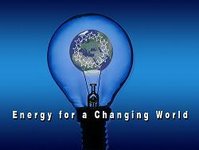Europe's "New Industrial Revolution"
 If we are learning anything in the new millennium it is that the Industrial Revolution of the last 150 years is overdue for a major upgrade. While we have come a long way from wood burning boilers (at least in some industries) we seem stuck on old ways of thinking about what is efficient and economical without considering the social costs related to:
If we are learning anything in the new millennium it is that the Industrial Revolution of the last 150 years is overdue for a major upgrade. While we have come a long way from wood burning boilers (at least in some industries) we seem stuck on old ways of thinking about what is efficient and economical without considering the social costs related to:
1 - particulate matter and toxic emissions from combustion
2 - wasted energy related to released heat and emissions
3 - energy transport and transmission from over centralization
4 - foreign resource and energy supply dependency
5 - carbon release into the atmosphere
6 - geopolitical and market competitiveness
7 - aging infrastructure
We need to look at feedstock and energy generation with a fresh eye - an eye for opportunities to improve the status quo in significant ways. The new European Union report entitled An Energy Policy for Europe gives a glimpse of what is under consideration for that continent with significant implications for the rest of the world.
To see other related European Union documents (plus laymen's summaries), visit the EU Press Room's Energy for a Changing World. Topics include: Renewable Energy Road Map, Progress in renewable electricity, Progress in Biofuels, Gas and Electricity Infrastructures, Nuclear Energy, Sustainable Power Generation from Fossil Fuels, and European strategic energy technology plan.
Below are some excerpts from the Biopact description of the Energy Policy's contents...
-------------------------
EU unveils energy policy for the 21st century: towards a 'low carbon economy' with renewables
Today, the Commission put forward a series of energy reports and policy proposals, which it hopes will be a catalyst for "a new industrial revolution" that will "transform Europe into a highly energy-efficient and low-CO2 energy economy" by the mid-century.
To address those challenges, the Commission proposes an Action Plan, to be implemented in the next three years. It calls on the European Parliament and on EU leaders to endorse the plan at the forthcoming summit in March. "The point of departure for a common energy policy must be combating climate change, promoting jobs and growth and limiting the EU's external vulnerability to imported hydrocarbons," the Commission says.
The new EU energy strategy is based on three main pillars:
1. Accelerating the shift to low carbon energy
In its report entitled the Renewables Energy Roadmap the Commission proposes to maintain the EU's position as a world leader in renewable energy, by proposing a binding target of 20% of its overall energy mix will be sourced from renewable energy by 2020. This will require a massive growth in all three renewable energy sectors: electricity, biofuels and heating and cooling. This renewables target will be supplemented by a minimum target for biofuels of 10%. In addition, a 2007 renewables legislative package will include specific measures to facilitate the market penetration of both biofuels and heating and cooling.
2. Creation of a true Internal Energy Market
The aim is to give real choice for EU energy users, whether citizens or businesses, and to trigger the huge investments needed in energy, as outlined in the policy proposal Prospects for the Internal Gas and Electricity Market. The single market is good not just for competitiveness, but also sustainability and security.
3. Energy efficiency
As outlined in the Strategic Energy Technology Plan [*.pdf], the Commission proposes that the use of fuel efficient vehicles for transport is accelerated; tougher standards and better labelling on appliances; improved energy performance of the EU's existing buildings and improved efficiency of heat and electricity generation, transmission and distribution. The Commission also proposes a new international agreement on energy efficiency.
The European Union cannot achieve its energy and climate change objectives on its own. It needs to work with both developed and developing countries and energy consumers and producers. The European Union will develop effective solidarity mechanisms to deal with any energy supply crisis and actively develop a common external energy policy to increasingly "speak with one voice" with third countries. It will endeavour to develop real energy partnerships with suppliers based on transparency, predictability and reciprocity.
technorati bioenergy, investment, Europe, biofuels, waste, environment, policy, sustainability



No comments:
Post a Comment